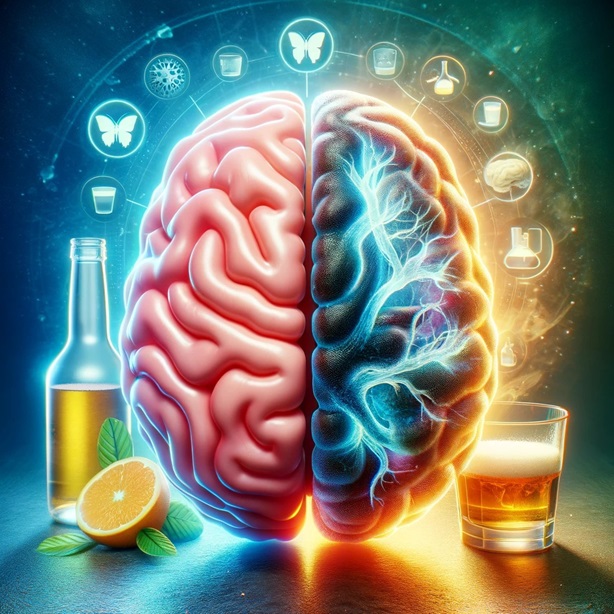Introduction
The relationship between alcohol consumption and brain health has been a focal point of scientific studies for many years. Researchers have extensively explored how alcohol impacts neuroplasticity, the brain's dynamic capability to adapt and rewire itself throughout an individual's life. While occasional moderate alcohol consumption may offer certain health advantages, such as potential heart health benefits, excessive and prolonged alcohol use has been shown to significantly impair brain function, leading to cognitive deficits and diminished neuroplastic capacity. This introduction discusses the dual nature of alcohol's impact on the brain, emphasizing the need for careful consumption practices.
Understanding the delicate balance between moderate and excessive consumption is key to mitigating the risks and maximizing any potential benefits. In this article, we delve into the complex effects of alcohol on the brain and explore strategies to safeguard cognitive health.
Alcohol's Effect on the Brain
Alcohol influences the brain in multifaceted ways. Primarily, it modifies the balance of neurotransmitters, disrupts communication between neurons, and can cause substantial damage to brain tissue. Chronic heavy drinking is particularly harmful, often resulting in a decrease in brain volume and the deterioration of critical areas involved in memory, decision-making, and executive functions. These physiological changes are accompanied by noticeable psychological effects, such as memory lapses, a diminished ability to concentrate, and compromised problem-solving skills, which collectively undermine an individual's daily functioning and quality of life.
In addition to these cognitive effects, alcohol can also exacerbate mental health conditions like depression and anxiety, creating a vicious cycle that further impairs brain health. The neurotoxic effects of alcohol are dose-dependent, meaning that higher consumption levels result in greater brain damage.
Understanding Neuroplasticity and Alcohol
Neuroplasticity plays an essential role in learning, memory formation, and the brain's recovery from injuries. Alcohol consumption interferes with these vital processes by impairing synaptic plasticity, which is crucial for the formation and consolidation of memories. Alcohol also negatively impacts various growth factors, such as brain-derived neurotrophic factor (BDNF), which supports neurogenesis and the maintenance of synaptic connections. Over time, the detrimental effects of alcohol can stifle the brain's ability to adapt and evolve, leading to long-term cognitive impairments.
Additionally, chronic alcohol use disrupts the brain's reward system, which can lead to increased tolerance and dependence. This dysregulation affects the brain's capacity for neuroplastic changes, further hindering cognitive functions and emotional regulation. Understanding these mechanisms is crucial for developing strategies to counteract alcohol-related cognitive decline.
Mitigating the Effects of Alcohol on the Brain
To mitigate the harmful effects of alcohol on the brain, several strategies can be employed. Adhering to recommended drinking guidelines helps limit alcohol's impact on cognitive health. Incorporating a diet rich in antioxidants can protect against oxidative stress caused by alcohol, while staying hydrated helps maintain overall brain health. Regular physical activity has been shown to stimulate neurogenesis and support cognitive functions that might be degraded by alcohol abuse. Additionally, engaging in cognitively demanding activities can enhance neuroplasticity, and a robust social support network can play a crucial role in moderating drinking behaviors and providing psychological benefits.
Other effective strategies include:
- Mindfulness and Meditation: Practicing mindfulness or engaging in meditation can reduce stress and improve cognitive function, counteracting some of the negative effects of alcohol on the brain.
- Sleep Hygiene: Maintaining a regular sleep schedule and ensuring quality sleep can enhance brain health and resilience against the impacts of alcohol.
- Limiting Alcohol Intake: Moderating alcohol consumption or choosing alcohol-free days can reduce the risk of cognitive decline and support brain health.
Long-Term Impact and Recovery
The brain has a remarkable ability to recover from the effects of alcohol, especially if consumption is significantly reduced or stopped. However, prolonged and heavy alcohol abuse may cause irreversible damage to brain structures and functions. Effective recovery strategies include complete abstinence, medical interventions to manage withdrawal symptoms and prevent relapse, and cognitive rehabilitation therapies that are designed to restore brain function and reinforce neuroplasticity. These approaches are critical for individuals recovering from alcohol dependence, helping them to regain cognitive abilities and improve their overall mental health.
Recovery also involves addressing co-occurring mental health issues, such as depression or anxiety, which often accompany alcohol dependence. Holistic approaches that incorporate lifestyle changes, therapy, and support groups are most effective for achieving long-term recovery and enhancing brain health.
Preventative Measures and Public Health Implications
Preventative measures are crucial in combating the adverse effects of alcohol on brain health. Public health initiatives that focus on educating individuals about the risks associated with excessive alcohol consumption and providing resources for dealing with alcohol dependency are essential for community health. Early intervention programs can effectively halt the progression of alcohol-induced cognitive decline, ensuring a healthier and more resilient brain across the population. These efforts are supported by a combination of policy actions, community-based interventions, and individual education to foster a more informed and health-conscious society.
Additionally, policymakers and healthcare providers can play key roles in creating environments that discourage excessive alcohol consumption and promote healthier lifestyle choices, further protecting brain health and well-being.
Conclusion
The influence of alcohol on brain health and its capacity for neuroplasticity is profound, particularly when consumption levels are high and sustained over long periods. A thorough understanding of these impacts is vital for anyone looking to make informed decisions about their drinking habits. Adopting protective lifestyle choices, accessing professional help when needed, and engaging in community support can all contribute to preserving brain health and minimizing the negative effects associated with alcohol use. Such proactive measures are indispensable in maintaining cognitive functions and ensuring a higher quality of life.
Ultimately, promoting brain health requires a comprehensive approach that balances the potential benefits and risks of alcohol consumption, encouraging mindful drinking behaviors and supporting long-term cognitive resilience.
